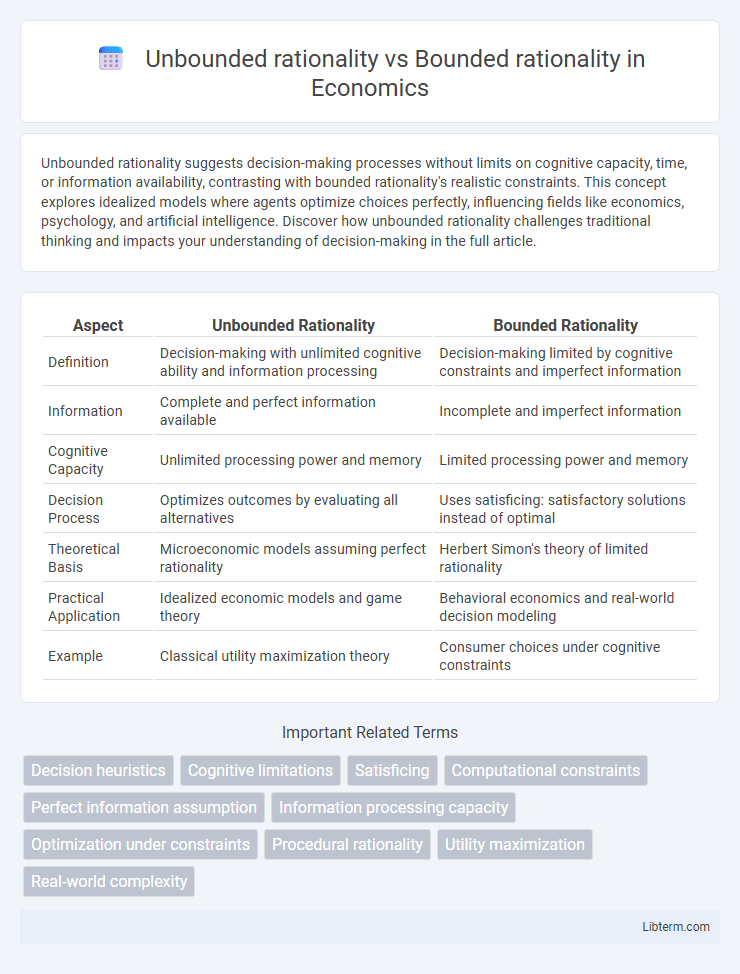Unbounded rationality suggests decision-making processes without limits on cognitive capacity, time, or information availability, contrasting with bounded rationality's realistic constraints. This concept explores idealized models where agents optimize choices perfectly, influencing fields like economics, psychology, and artificial intelligence. Discover how unbounded rationality challenges traditional thinking and impacts your understanding of decision-making in the full article.
Table of Comparison
| Aspect | Unbounded Rationality | Bounded Rationality |
|---|---|---|
| Definition | Decision-making with unlimited cognitive ability and information processing | Decision-making limited by cognitive constraints and imperfect information |
| Information | Complete and perfect information available | Incomplete and imperfect information |
| Cognitive Capacity | Unlimited processing power and memory | Limited processing power and memory |
| Decision Process | Optimizes outcomes by evaluating all alternatives | Uses satisficing: satisfactory solutions instead of optimal |
| Theoretical Basis | Microeconomic models assuming perfect rationality | Herbert Simon's theory of limited rationality |
| Practical Application | Idealized economic models and game theory | Behavioral economics and real-world decision modeling |
| Example | Classical utility maximization theory | Consumer choices under cognitive constraints |
Introduction to Rationality in Decision-Making
Unbounded rationality assumes decision-makers have unlimited cognitive resources to analyze all available information and optimize outcomes perfectly. Bounded rationality recognizes cognitive limitations, incomplete information, and time constraints, leading to satisficing rather than optimizing decisions. Understanding these models is crucial for designing realistic decision-making frameworks in economics, psychology, and artificial intelligence.
Defining Unbounded Rationality
Unbounded rationality refers to the decision-making process where individuals possess unlimited cognitive capabilities, complete information, and infinite time to analyze every possible alternative to maximize utility. This idealized model assumes perfect knowledge and computational power, enabling optimal choices without any constraints. Unlike bounded rationality, unbounded rationality disregards practical limitations such as cognitive biases, incomplete data, and time restrictions.
Understanding Bounded Rationality
Bounded rationality refers to the concept that individuals make decisions with limited cognitive resources, incomplete information, and finite time, contrasting with the idealized notion of unbounded rationality where decision-makers have unlimited computational capacity and perfect knowledge. This concept, introduced by Herbert A. Simon, emphasizes satisficing--seeking a solution that is good enough rather than optimal--due to constraints in human cognition and environmental complexity. Understanding bounded rationality is crucial for modeling realistic economic behavior and designing policies that account for actual decision-making processes under uncertainty.
Key Differences Between Unbounded and Bounded Rationality
Unbounded rationality assumes decision-makers have unlimited cognitive resources and access to all relevant information, enabling optimal choices. Bounded rationality recognizes human cognitive limitations and incomplete information, leading to satisficing decisions rather than optimal ones. Key differences include the scope of information processing, computational capacity, and the realism of assumptions regarding human decision-making behavior.
Historical Perspectives on Rationality Theories
Early theories of rationality, rooted in classical economics, posited unbounded rationality, assuming individuals possess unlimited cognitive capabilities and access to all relevant information to make optimal decisions. Herbert Simon introduced the concept of bounded rationality in the mid-20th century, emphasizing cognitive limitations and imperfect information as fundamental constraints on decision-making processes. This shift marked a pivotal historical evolution, integrating psychological insights into economic theory and challenging the idealized notion of perfectly rational agents.
Real-World Applications of Unbounded Rationality
Unbounded rationality assumes agents have unlimited cognitive resources and information processing capabilities to make perfectly rational decisions, which is often applied in economic models predicting ideal market behaviors and optimal resource allocation. Real-world applications include advanced AI systems in algorithmic trading and supply chain optimization, where extensive data processing enables near-optimal decision-making. Despite practical limitations, unbounded rationality frameworks offer benchmarks for evaluating decision quality in complex environments like finance and operations management.
Practical Examples of Bounded Rationality
Bounded rationality is demonstrated in real-world scenarios where decision-makers face limited information, cognitive constraints, and time pressures, such as a consumer choosing a smartphone without exhaustive research, relying instead on heuristic shortcuts like brand reputation or price. In business, managers often use satisficing, opting for a solution that meets minimum criteria rather than the optimal one, evident in hiring decisions made quickly to fill urgent vacancies. Similarly, investors practicing bounded rationality may follow rules of thumb or rely on past performance data instead of attempting to calculate every possible market outcome.
Implications for Economic and Behavioral Sciences
Unbounded rationality assumes decision-makers have unlimited cognitive resources and complete information, enabling optimal economic choices, while bounded rationality acknowledges cognitive limitations and imperfect information, leading to satisficing rather than maximizing behavior. This distinction influences economic modeling by challenging the assumption of fully rational agents, promoting the incorporation of heuristics and biases in behavioral economics. Understanding bounded rationality improves predictions of real-world decision-making, policy design, and market behavior analysis.
Criticisms and Limitations of Rationality Models
Unbounded rationality assumes agents have infinite cognitive resources and access to all relevant information, which is criticized for being unrealistic in complex, real-world decision-making. Bounded rationality addresses these limitations by recognizing cognitive constraints and incomplete information but is limited by its reliance on satisficing solutions rather than optimal choices. Both models face challenges in accurately predicting human behavior due to the influence of emotions, heuristics, and social factors that often deviate from purely rational calculations.
Future Directions in Rationality Research
Future directions in rationality research emphasize integrating insights from neuroscience and behavioral economics to refine models of unbounded and bounded rationality. Advances in artificial intelligence and machine learning offer promising tools to simulate decision-making processes under cognitive constraints, enhancing predictions of human behavior. Emerging research also explores adaptive rationality frameworks that account for environmental complexity and individual variability in cognitive resources.
Unbounded rationality Infographic

 libterm.com
libterm.com